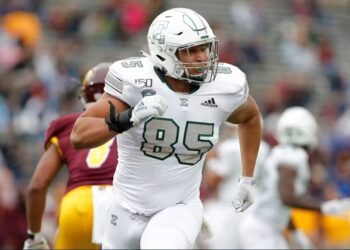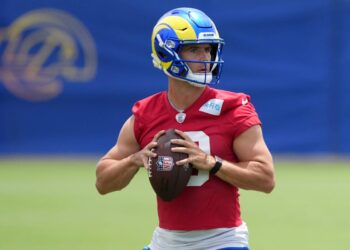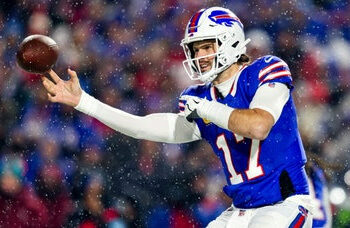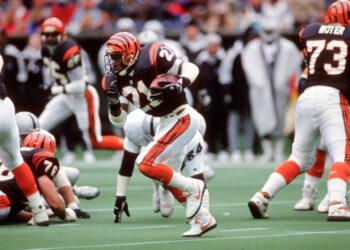Russell Wilson’s rise to NFL stardom is one of the most compelling and inspiring stories in professional football. Often overlooked due to his height and unconventional path, Wilson defied expectations to become one of the most successful and respected quarterbacks in the league. His journey from a late-round draft pick to Super Bowl champion and perennial Pro Bowler exemplifies perseverance, discipline, and unmatched leadership.
Born on November 29, 1988, in Cincinnati, Ohio, and raised in Richmond, Virginia, Wilson was immersed in athletics from a young age. His father, Harrison Wilson III, played football and baseball at Dartmouth, and his grandfather played basketball at Kentucky State. Athleticism ran in the family, but so did high expectations. From early on, Wilson was driven not only to excel on the field but also to maintain academic and personal discipline.
Wilson’s football journey began in earnest at Collegiate School in Richmond, where he quickly distinguished himself as a dual-threat quarterback. Despite an impressive high school career, Wilson faced skepticism from college recruiters because of his height — just 5 feet 11 inches, short by NFL quarterback standards. He eventually committed to North Carolina State, where he had a productive career but clashed with coaches over his desire to also pursue baseball.
After graduating from NC State, Wilson transferred to the University of Wisconsin for his final season of eligibility. There, he led the Badgers to a Big Ten title and a Rose Bowl appearance, breaking numerous records along the way. Still, NFL scouts remained hesitant. In the 2012 NFL Draft, Wilson fell to the third round, where he was selected 75th overall by the Seattle Seahawks. The pick was seen by many as a gamble; after all, how could a quarterback of Wilson’s stature succeed in a league built for taller, pocket-passing signal callers?
Wilson wasted no time proving his doubters wrong. As a rookie, he won the starting job in preseason and led the Seahawks to an 11-5 record and a playoff berth. His poise, football IQ, and uncanny ability to make plays under pressure stood out immediately. The next year, in the 2013 season, Wilson led Seattle to a 13-3 record and a dominant playoff run that culminated in a 43-8 blowout win over the Denver Broncos in Super Bowl XLVIII. At just 25 years old, he was a Super Bowl champion — and had silenced all the critics.
What makes Wilson’s story so unique is not just his early success, but his sustained excellence. Over the next several seasons, he led the Seahawks to multiple playoff appearances, earned nine Pro Bowl selections (as of 2023), and consistently ranked among the league’s top quarterbacks in passer rating, touchdowns, and wins. He combined mobility with pinpoint accuracy and brought a cerebral approach to the game, often outsmarting defenses with pre-snap reads and post-snap improvisation.
Yet Wilson’s career has not been without its challenges. After nearly a decade in Seattle, tensions with management and coaching staff surfaced. In 2022, he was traded to the Denver Broncos in a blockbuster move that shocked the NFL world. His first season in Denver was rocky, marked by injuries, offensive struggles, and criticism from fans and analysts alike. Still, true to form, Wilson remained optimistic and focused on improvement, emphasizing his commitment to hard work and leadership.
Off the field, Wilson has also established himself as a model athlete. He is known for his deep Christian faith, charitable work, and motivational presence. Through his Why Not You Foundation, he has supported education, health, and poverty alleviation efforts for underprivileged youth. His marriage to pop star Ciara has also kept him in the public eye, but he has consistently maintained a reputation for humility and integrity.
Russell Wilson’s story resonates because it is a classic underdog tale. In a sport where physical prototypes often dominate draft boards, Wilson broke the mold and redefined what a successful NFL quarterback could look like. He inspired a new generation of shorter, mobile quarterbacks — like Kyler Murray and Bryce Young — to believe they, too, could succeed at the highest level.
Ultimately, Wilson’s legacy will not just be measured in Super Bowl rings or passing yards, but in the barriers he broke and the standard he set. He may have been an unlikely superstar, but through determination, resilience, and belief in himself, Russell Wilson became an icon of the modern NFL — a true testament to what’s possible when tal
ent meets tenacity.











